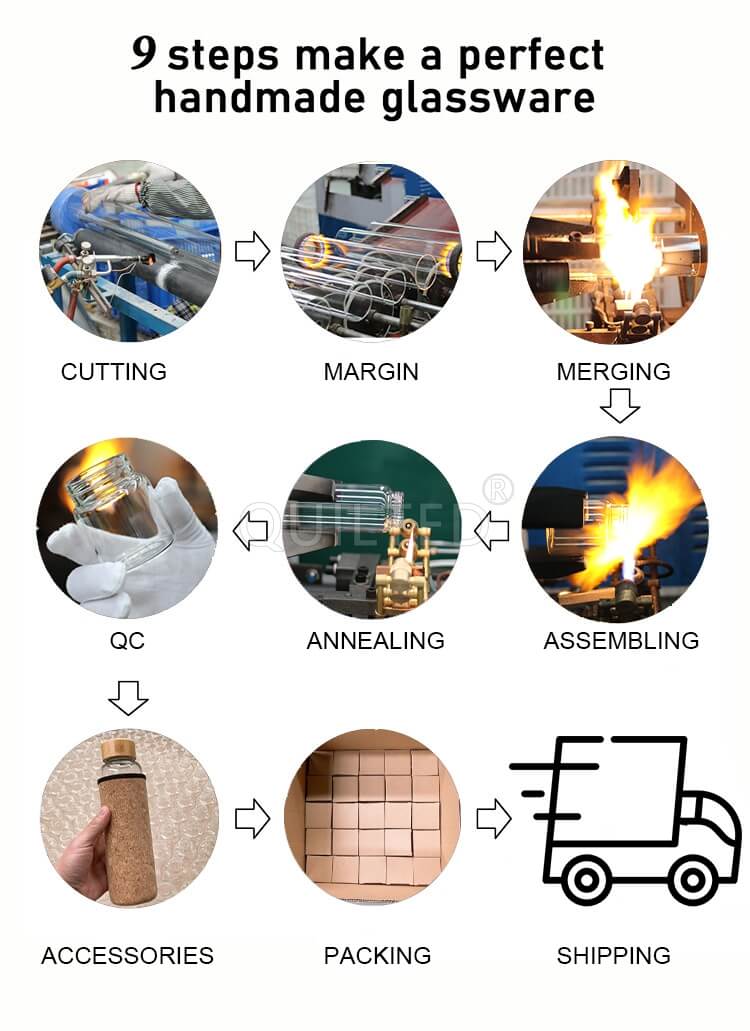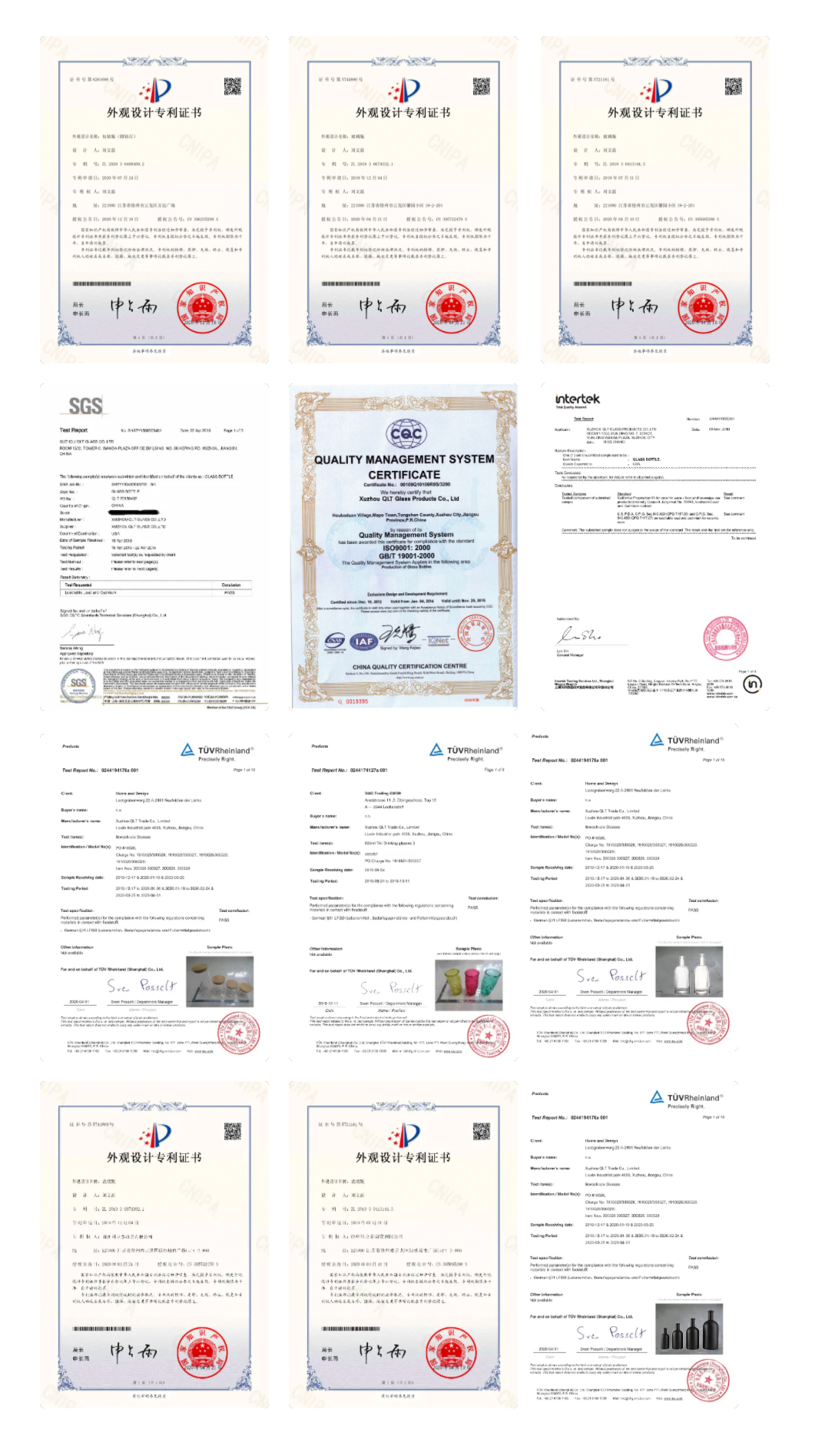The manufacturing of glass bottles is a complex and precise process that involves multiple stages, including raw material preparation, melting, forming, annealing, inspection, and packaging. Below is a detailed description of each process, along with a comparison of how the general industry operates versus QLT Glass’s unique approach, highlighting our advantages.
1. Raw Material Preparation
General Industry Practices:
Most glass bottle manufacturers use standard lifting equipment, weighing machines, and mixing systems to prepare the batch materials. These materials include silica sand, dolomite, limestone, recycled glass, and other minerals. However, many manufacturers lack stringent screening procedures for recycled glass, which may lead to impurities in the final product.
We utilize an advanced automated mixing system combined with high-precision detection equipment to ensure that all raw materials are thoroughly screened and cleaned before entering the mixing process. Our recycled glass is sorted using laser spectrometry technology to remove impurities. The material ratios are computer-controlled for consistency and high quality.
Benefits:
• Eliminates impurities that affect the glass quality, ensuring a purer final product.
• Precise mixing ratios improve melting efficiency and reduce energy consumption.
• Higher purity raw materials result in glass with better transparency and durability.
2. Melting Process
General Industry Practices:
Glass bottle manufacturers commonly use traditional furnaces, with temperature control relying heavily on manual experience. This often leads to temperature fluctuations, affecting the uniformity of the molten glass. Feeding systems may face issues like clogging or inconsistent flow, which can reduce production efficiency.
QLT Glass’s Approach:
We use state-of-the-art intelligent glass furnaces with automated temperature control systems to maintain a stable 1450°C melting temperature. Our optimized feeder design, paired with a real-time monitoring system, ensures smooth and consistent flow of molten glass.
Benefits:
• Stable temperature control minimizes bubbles and texture defects in the glass.
• Smooth feeding process enhances production efficiency, ideal for large-scale manufacturing.
• Energy-efficient design reduces costs and carbon emissions, aligning with environmental standards.
3. Forming and Annealing
General Industry Practices:
Forming processes in the industry often rely on traditional bottle-making machines. Equipment wear or poor-quality molds can result in uneven bottle finishes, irregular thickness, or misaligned bottle mouths. Annealing processes with imprecise temperature or timing control may leave residual stresses, compromising the glass’s strength and durability.
QLT Glass’s Approach:
We use SGS-certified high-precision bottle-making machines and custom-designed molds to ensure that every glass bottle meets exact design specifications. Our annealing ovens feature advanced temperature control systems that gradually cool the bottles, eliminating residual stress and enhancing durability.
Benefits:
• High-quality molds ensure smooth surfaces, precise dimensions, and enhanced aesthetics.
• Stress-free annealing improves impact resistance and extends product lifespan.
• Compliant with FDA and EU food-grade standards, making our bottles ideal for food and beverage packaging.
4. Inspection and Packaging
General Industry Practices:
Inspection and packaging are often performed manually or semi-automatically in the industry. Manual inspection is prone to errors, and packaging methods are often generic, failing to meet customers’ specific requirements for safety or customization.
QLT Glass’s Approach:
We employ an AI-powered visual inspection system that quickly identifies defects such as bubbles, cracks, or uneven thickness, ensuring a 99.9% product pass rate. For packaging, we offer customized solutions, including anti-shock protection layers and eco-friendly packaging materials, tailored to customer needs.
Benefits:
• Automated inspection eliminates human error and ensures compliance with export standards.
• Customizable packaging enhances product protection and customer satisfaction.
• Streamlined processes accelerate delivery timelines, improving customer experience.
5. Sustainability and Environmental Responsibility
General Industry Practices:
Many manufacturers lack robust environmental management systems. Recycling rates are often low, and waste is not properly handled, leading to resource inefficiencies and environmental pollution.
QLT Glass’s Approach:
We prioritize green manufacturing by adhering to EU environmental regulations. Over 70% of our recycled glass is reused, and all waste is professionally treated and reintegrated into production. Our energy-efficient furnaces and low-emission technologies significantly reduce our carbon footprint.
Benefits:
• Conserves resources while minimizing environmental impact.
• Complies with international environmental standards, building trust with clients.
• Our commitment to sustainability strengthens our long-term competitiveness.
Summary: The QLT Glass Advantage
While the glass bottle manufacturing process may appear similar across the industry, QLT Glass stands out through our meticulous process improvements, technological advancements, and stringent quality controls at every stage.
Our Core Advantages:
• Precise material preparation and pure raw materials for superior glass quality.
• Stable melting and forming processes for consistent results and efficiency.
• Advanced inspection and customizable packaging to meet diverse customer needs.
• Sustainable practices that align with global environmental and ethical standards.
By choosing QLT Glass, you not only receive high-quality glass bottle products but also gain a trusted partner committed to excellence, innovation, and environmental responsibility.
Post time: Jan-01-2025


